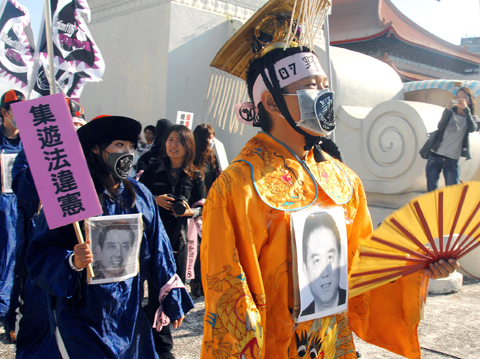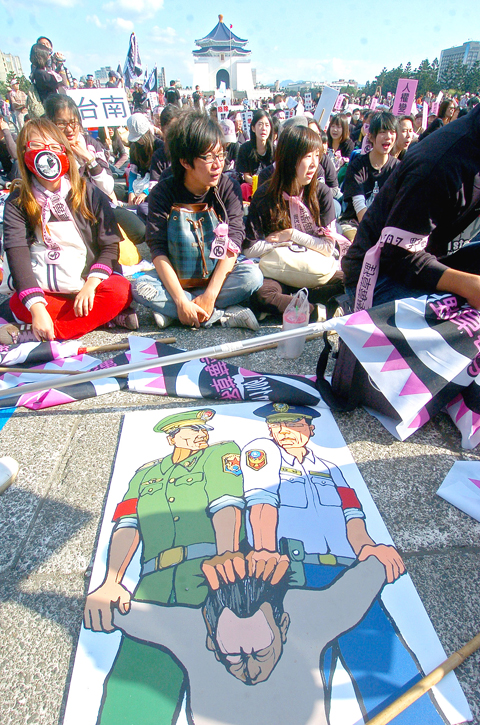The Wild Strawberry Student Movement marked its one-month anniversary in Taipei yesterday with a rally featuring a mock funeral for the nation’s human rights, attracting several thousand participants of all ages.
The demonstrators, who only reported their planned event to the police instead of seeking approval from law enforcement authorities as required by the Assembly and Parade Law (集會遊行法), peacefully marched to the Legislative Yuan, the Control Yuan, the Executive Yuan, the National Police Agency (NPA) and Ketagalan Boulevard in front of the Presidential Office.
The 2.7km march began at 2pm, with student protesters from around Taiwan and a number of non-governmental organization members dressed in black marching down Zhongshan S Road with a banner that read “peaceful, rational and maintaining order [even though we only] reported [the rally].”

PHOTO: AFP
An estimated 4,000 people joined the protest, event organizers said. Students wore Qing dynasty emperor’s and officials’ costumes with pictures of President Ma Ying-jeou (馬英九), Premier Liu Chao-shiuan (劉兆玄), NPA Director-General Wang Cho-chiun (王卓鈞) and National Security Bureau Director-General Tsai Chao-ming (蔡朝明).
A couple brought their son and daughter to the parade, carrying a symbolic reaping-hook and dragging several dolls colored in red on the ground, a move they said symbolized the death of the nation’s human rights.
As the rally participants proceeded with their demonstration, they were stopped by a small number of police officers near National Taiwan Democracy Memorial Hall, the legislature and Ketagalan Boulevard, but the police officers only issued warnings and did not block them.

PHOTO: WANG MIN-WEI, TAIPEI TIMES
The officers left the scene as rally participants and supporters applauded the officers for carrying out their police duty instead of clashing with them.
The event was highlighted with a mock funeral for human rights in the middle of the boulevard — about 250m away from the Presidential Office — with four students dressed in black suits carrying a coffin symbolizing human rights and covering it with a national flag, as the event organizers played the national anthem in the background.
The protesters returned to Liberty Square at the hall after the “funeral.” No conflicts took place throughout the rally.
The students had staged nationwide silent sit-ins since Nov. 6 to protest what they called excessive police force during a visit by Chinese envoy Chen Yunlin (陳雲林) early last month.
The students have called for an immediate amendment to the assembly law and for Ma and Liu to apologize and Wang and Tsai to resign.
The Executive Yuan on Thursday responded to the students’ appeals by approving a proposed amendment to the assembly law that scrapped the police’s authority to approve or disapprove a rally application.
Many of the student protesters questioned the government’s sincerity in amending the law, saying that there was nothing different between the proposed amendment and the current law because organizers would still be required to register their activities five days in advance.
The students criticized the government’s proposal for three situations in which police would be empowered to inform organizers within 36 hours of registration that their plans were not acceptable.
The three situations were: if the event would jeopardize national security, social order or the public interest; if it would endanger lives, freedom or property; or when an event taking place close to another could cause problems.
Hsu Jen-shou (??, director of yesterday’s rally, said the government did not intend to account for or take responsibility for the authority police allegedly abused during Chen’s visit.
“The Wild Strawberries strongly demand that the governing [Chinese Nationalist Party (KMT)] party immediately promise within three days that the power abuse and violations of freedom of speech during Chen’s stay in Taiwan will never happen again,” he said.
Although the Wild Strawberries is a student movement, the parade yesterday attracted non-students as well.
“We have to speak out,” a 63-year-old woman surnamed Chen (陳) said. “Because we’re suffering setbacks in human rights, we’re being betrayed by our own government.”
Chen’s husband and daughter, who accompanied her, nodded in agreement.
Wang Hao-han (王顥翰), a 23-year-old student at Soochow University’s Center for Study of Human Rights, said he was upset with the Assembly and Parade Law revision proposed by the Executive Yuan.
“I’m not sure if I should call it an ‘improved version’ [as the government claims], because the new version is more strict than the current one,” he said. “Right now, an unapproved demonstration could only be considered illegal after the police issue three warnings, but in the new version, you’re in trouble already if you didn’t notify the police in advance.”
The concern of National Chiaotung University student surnamed Liu (劉) perhaps explains why many demonstrators declined to reveal their full names during interviews.
“We’ve observed a rapid deterioration of human rights in the country — who knows what would happen to me if my name got published in a newspaper?” he said. “So a lot of us would rather keep a low-profile.”
Many foreigners in Taiwan were spotted at the demonstration.
Most civic groups were happy to see the number of people on the street.
“We organized various events on human rights in the past month and now we’re very tired,” Taiwan Association for Human Rights secretary-general Tsai Chi-hsun (蔡季勳) said yesterday. “It’s good to see so many people are still concerned about the issue, and remain peaceful the whole time.”

Auckland rang in 2026 with a downtown fireworks display launched from New Zealand’s tallest structure, Sky Tower, making it the first major city to greet the new year at a celebration dampened by rain, while crowds in Taipei braved the elements to watch Taipei 101’s display. South Pacific countries are the first to bid farewell to 2025. Clocks struck midnight in Auckland, with a population of 1.7 million, 18 hours before the famous ball was to drop in New York’s Times Square. The five-minute display involved 3,500 fireworks launched from the 240m Sky Tower. Smaller community events were canceled across New Zealand’s

The Ministry of Foreign Affairs (MOFA) yesterday said it is closely monitoring developments in Venezuela, and would continue to cooperate with democratic allies and work together for regional and global security, stability, and prosperity. The remarks came after the US on Saturday launched a series of airstrikes in Venezuela and kidnapped Venezuelan President Nicolas Maduro, who was later flown to New York along with his wife. The pair face US charges related to drug trafficking and alleged cooperation with gangs designated as terrorist organizations. Maduro has denied the allegations. The ministry said that it is closely monitoring the political and economic situation

‘SLICING METHOD’: In the event of a blockade, the China Coast Guard would intercept Taiwanese ships while its navy would seek to deter foreign intervention China’s military drills around Taiwan this week signaled potential strategies to cut the nation off from energy supplies and foreign military assistance, a US think tank report said. The Chinese People’s Liberation Army (PLA) conducted what it called “Justice Mission 2025” exercises from Monday to Tuesday in five maritime zones and airspace around Taiwan, calling them a warning to “Taiwanese independence” forces. In a report released on Wednesday, the Institute for the Study of War said the exercises effectively simulated blocking shipping routes to major port cities, including Kaohsiung, Keelung and Hualien. Taiwan would be highly vulnerable under such a blockade, because it

UNRELENTING: China attempted cyberattacks on Taiwan’s critical infrastructure 2.63 million times per day last year, up from 1.23 million in 2023, the NSB said China’s cyberarmy has long engaged in cyberattacks against Taiwan’s critical infrastructure, employing diverse and evolving tactics, the National Security Bureau (NSB) said yesterday, adding that cyberattacks on critical energy infrastructure last year increased 10-fold compared with the previous year. The NSB yesterday released a report titled Analysis on China’s Cyber Threats to Taiwan’s Critical Infrastructure in 2025, outlining the number of cyberattacks, major tactics and hacker groups. Taiwan’s national intelligence community identified a large number of cybersecurity incidents last year, the bureau said in a statement. China’s cyberarmy last year launched an average of 2.63 million intrusion attempts per day targeting Taiwan’s critical